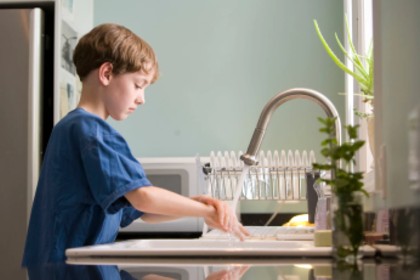Super Lawyers Honors 2025 Kotz Sangster Attorneys

Kotz Sangster is pleased to announce the recognition of our attorneys as 2025 Michigan Super Lawyers and Rising Stars.


In late 2019, a new virus, COVID-19, was identified in Wuhan, China. Since then, the virus has spread around the globe. On March 11, 2020, the World Health Organization (WHO) declared the coronavirus outbreak a global pandemic. On March 13, 2020, President Trump declared a national emergency, which could free up to as much as $50 billion in federal assistance to state and local governments to fight COVID-19.
For employers, dealing with the COVID-19 crisis can be overwhelming. The following provides some guidance for employers going forward.
If an employee appears for work exhibiting the symptoms of COVID-19, employers should privately separate that employee from other employees and send that employee home. Ask the employee if s/he was in close contact with any other employee; those employees should also be sent home. If the employee calls in sick, ask the employee if s/he has symptoms consistent with COVID-19. Employees should remain home for a 14-day quarantine period. This will help to ensure that the virus does not spread. The same is true for employees who have come in contact with someone who has a presumptive positive COVID-19 diagnosis.
Remember, however, that an employee’s medical information and his/her identity should be kept confidential. Medical information should be kept separate from the employee’s personnel file.
If an employee has recently returned from travel to a country with a COVID-19 outbreak, i.e., China, South Korea, Iran or Italy, employers can require that employee to self-quarantine for 14 days before returning to work.
If employees are off work due to COVID-19, they can use any accrued paid time off on those days. However, after they exhaust any paid time off, including any time off relative to the Michigan Paid Medical Leave Act (PMLA), any obligation to pay the employee depends on whether the employee is exempt or non-exempt. Generally, an employer only needs to pay non-exempt employees for the actual hours they work. Exempt employees must be paid their full weekly salary if they perform any work during a week. If the exempt employee is unable to work because of COVID-19 diagnosis, most likely, the employer would not need to pay the exempt employee after s/he has exhausted his/her paid time off. A link to the Department of Labor’s “COVID-19 or Other Public Health Emergencies and the Fair Labor Standards Act Questions and Answers” can be found on the PDF document here.
In light of the government-mandated school closures in the state of Michigan, employers who are subject to the PMLA should be aware that eligible employees may use their accrued paid medical leave if they need to care for a child whose “school or place of care has been closed” due to a public health emergency. Employees may also be able to use PMLA if they have been directed to self-quarantine, or if the employee’s workplace has been closed due to a public health emergency.
On March 16, 2020, Governor Whitmer signed an Executive Order temporarily expanding eligibility for unemployment benefits, effective immediately and lasting until April 14, 2020. These expanded benefits include:
• Employees who leave work if they need to care for someone with a confirmed diagnosis or for family care as a result of a government directive, i.e., school closings; workers who are sick, quarantined or unable to work and who do not have access to paid leave options; and first responders and health care workers who become ill after exposure to a patient with COVID-19 are now eligible for benefits.
• Work search requirements and in-person work registration requirements in coronavirus claims are waived.
• Application eligibility period extended from 14 to 28 days.
• Employer accounts for benefits resulting from layoffs and other unemployment because of an executive order requiring the closure or limitation of operations will not be charged.
• Unemployment duration temporarily extended from 20 to 26 weeks.
On March 14, 2020, the U.S. House of Representatives passed the Families First Coronavirus Response Act. On March 16, 2020, the House approved new text which was intended to correct previous drafting errors. It is expected that the Senate will vote on it on March 18, 2020. Further updates will be provided if and when the bill passes.
WORKPLACE SAFETY ISSUES
• Ensure that employee have the facilities and supplies necessary to frequently wash their hands.
• Consider allowing employees to work remotely.
• Have employees use teleconferencing to avoid in-person meetings.
• Use email and phones to communicate when possible.
• Follow updates from the CDC, OSHA and WHO.
Lastly, as a reminder, the Occupational Safety and Health Administration (OSHA) published its Guidance on Preparing Workplaces for COVID-19, the link which can be found on the PDF document here. The Centers for Disease Control and Prevention has also published COVID-19 guidelines, which can also be found on the PDF document here.
In order to minimize the risk of transmission, employers should be telling employees:
• Wash your hands often with soap and water for at least 20 seconds, especially after blowing your nose, coughing, or sneezing; going to the bathroom; and before eating or preparing food.
• Avoid touching your eyes, nose, and mouth with unwashed hands.
• Avoid shaking hands.
• Avoid close contact with people who are sick.
• Stay home when you are sick. Employees who are sick should remain at home until 24 hours after their fever has ended without the use of fever-reducing medications.
• Cover your cough or sneeze with a tissue, then throw the tissue in the trash.
• Use an alcohol-based hand sanitizer (at least 60% alcohol) when handwashing isn’t possible.
• Use disinfecting wipes to clean your work space’s frequently-touched surfaces.
If you have any questions regarding this article, or any other questions related to COVID-19, contact attorney Bethany Sweeny at (313) 259-8786 or bsweeny@kotzsangster.com.